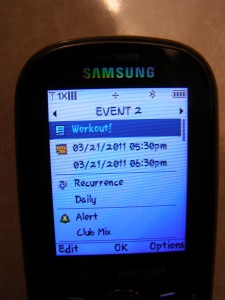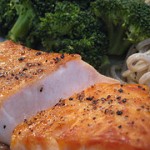by Michelle Sutton-Kerchner
Attention-deficit/hyperactivity disorder (ADHD) might sound like a Type A personality on steroids who is always eager for a workout. Someone who multitasks like crazy, with excessive energy and impulsive behavior. In reality, symptoms often sabotage fitness efforts. Discover strategies—and foods—to help overcome the challenges of ADHD…
Surprisingly, research has proven a link between ADHD and obesity. An overweight person isn’t the typical image of hyperactivity. However, there is a solid connection between those who suffer from this disorder and weight gain. Although the cause is not fully understood, theories indicate two culprits: the inability to stay focused and control impulses.
All of us can be distracted from fitness endeavors and our desire to adhere to a nutritious diet. For a person with ADHD, those challenges are magnified. With a predisposition to be sidetracked, a specifically scheduled time for a daily workout can be unintentionally neglected. You can be deterred en route to the Exercise Floor by a random phone call or sudden need for pizza with friends.
With resolve diminished and confidence defeated, it’s easier to spontaneously consume unhealthy foods. There is no place for impulsive eating in any kitchen. Those who suffer ADHD are at greater risk for submitting to fatty, sugary treats. In an attempt to soothe frustrations common to ADHD, and simply because the ADHD brain is wired without the same impulse control, binging is more common.

Guidelines to stay on track:
- Schedule regular trips to the grocery store. Bring a list! When heading down the cookie aisle, a list is the perfect reminder to redirect your cart.
- Take advantage of technology. Computers, smart phones, and desktop clocks have the ability to signal everything from when you are ovulating to the next Zumba class. Schedule fitness times on all your gadgets.
- Hire a personal trainer. Being accountable to someone else and their schedule assures adherence. (No one wants to be late for an appointment with a trainer and his/her body of steel.)
- Write down your goals. It’s tricky to accomplish goals when you forget what they are.
- Try keeping a list of the foods you consume. Hang a magnetic tablet on the fridge. Recording what and how much you eat can be just the “distraction” you need. You’re forced to stop and think about why you are eating and the value (nutrition or emotional) of the food.
You Aren’t Alone
Approximately 10 million people are thought to be affected by ADHD. Eighty percent of children with ADHD grow up to be adults with the disorder. However, many adults aren’t diagnosed.
Although the characteristics of ADHD have been recognized since 1902, only much more recently were these characteristics associated with a medical condition. Without widespread awareness, ADHD often went undetected. Inexplicable difficulties common to the disorder were all the more frustrating without understanding their origin. Once diagnosed, adults frequently find relief in knowing their struggles are based on a neurological condition, rather than characters flaws. A huge boost to self-image.

Typically, adult ADHD gets recognized after one’s child is diagnosed with the condition. Parallels are then recognized between parent and child. Lifelong issues finally become understood and can be solved through treatment and medication. Today, we recognize some of history’s greats as sufferers of ADHD, including: Thomas Edison, Wolfgang Mozart, and Ben Franklin.
Get Evaluated
A healthcare practitioner who specializes in adult ADHD can determine if you’re suffering from it. S/he will review symptoms, discuss childhood experiences (since ADHD typically originates in childhood), ask about current relationships and careers, and use standardized scales to interpret answers. A physical exam and psychological testing are also necessary for a definitive diagnosis. Sometimes, anxiety disorders or other medical conditions can mimic ADHD.
Results from your evaluation are compared to industry-accepted clinical guidelines. The objectivity of the guidelines complements the physician’s assessment of your personal situation. For a positive diagnosis, you must have major, behavior-related problems in at least two of the following: job, home, school, or social outlets.
Signs of ADHD include:
- Easily distracted
- Very disorganized
- Unable to maintain steady work
- Seldom on time
- Relationship troubles from forgetfulness, unreliability, and inability to accomplish fair share of tasks
- Constant procrastination
- Fidgety to an extreme
- Often frustrated
- Frequent interrupting during conversations
- Short attention span
- Extremely impatient
- Starting multiple projects simultaneously and rarely finishing them
- Frequently losing things
Treatment Plan
Research hints at a dysfunction of the neurochemical dopamine as the cause of ADHD. Often, medication is prescribed for ADHD, which improves chemical imbalances and reduces associated symptoms. Behavior therapy treatment is also common. Techniques to reinforce positive behavior must constantly be tweaked to succeed against a short attention span and predisposition to boredom.
Exercise encourages the production of dopamine, norepinephrine, and serotonin, which has much the same effect on the brain as traditional drugs used to treat ADHD. “In essence, exercise does for the brain the same thing that medications do,” attests licensed clinical social worker Kerri Golding who specializes in, and personally suffers from, ADHD.
The increased levels of dopamine pulsing through the body during exercise help one focus and improve attention span. Exercise also produces endorphins, the feel-good brain chemical, which counteracts depression, a common sidekick to ADHD.
Hyperactivity and restlessness are also calmed after a healthy workout. Plus, calories are burned from any impulsive overeating, which helps maintain a healthy weight. Preliminary studies are finding physical activity as a potential intervention for treating ADHD symptoms overall.
Fitness experts recommend changing your workout routine on a regular basis, usually every six weeks. For someone dealing with ADHD, constant variety is especially important. It prevents the typical fitness plateau on a physical level, and also prevents boredom and disinterest common to this disorder. When creating a fitness program, consider circuit training or a Group Fitness class that evolves each week.
Even the most committed fitness enthusiasts sometimes struggle to keep interested in their workout. Tackle a variety of exercise equipment. With the Center’s expansive selection, you can cycle one day, use the rowing machine another, and enjoy an aquatic workout later in the week. Take advantage of the variety. Your mind craves it, as well as you body.
Some other suggestions include varying the time of day you exercise, joining a friend for a workout, and regularly introducing new fitness classes or techniques (boxing anyone?). Use the hyperactivity and shortened attention span associated with ADHD to your benefit. The body excels from regular exercise but not stagnant fitness programs.

Something to Chew On
Although evidence hasn’t yet been confirmed, studies are finding a link between diet and ADHD symptoms. Food colorings, flavorings, and preservatives have been shown to trigger or worsen hyperactivity. Spikes in blood sugar can increase aggressive behavior and the inability to process sensory stimulation. Monitoring sugar intake, and eating regularly throughout the day, is essential for a healthy diet. The benefits can be even greater for the person with ADHD.
Some studies suggest including ample amounts of omega-3 fatty acids, protein, and complex carbohydrates in your daily diet. Small doses of caffeine may increase concentration and attention. Although these may not specifically improve ADHD, they contain properties that enhance brain function and help manage symptoms.
Consider adding and eliminating items from your diet, one at a time on a weekly basis. Keep a food journal and determine what, if any, improvements you discover. The Center offers nutritional counseling and seminars. Investigate to further determine your healthiest diet.
Exercise may not cure a disorder like ADHD. However, it certainly is a healthy outlet to ease many of the symptoms. It works for Olympic Medalist Michael Phelps who “feels like a different person in the pool.” You can bet he does.
Sources
“ADD/ADHD and Obesity: Seven Tips That Will Help You Win the Battle,” by Gina Roberts-Grey at www.everydayhealth.com.
“ADHD Diet: Do Food Additives Cause Hyperactivity?” by John E. Huxsahl, at www.mayoclinic.com.
“Can You Exercise Away ADHD Symptoms?” by Kristen Stewart at www.everydayhealth.com.
“Famous People Get ADHD, Too,” by Chris Iliades at www.everydayhealth.com.
“How Exercise Helps with ADHD Symptoms,” by Jean Rothman at www.everydayhealth.com.
“Is an ADHD Diet the Answer?” by Katherine Lee at www.everydayhealth.com.
“Understanding and Diagnosing Adult ADHD,” by Jean Rothman at www.everydayhealth.com.
Image Credits
Exclamation (introductory picture): www.flickr.com/photos/gravitysapplenz/3782701887/
Crowd: www.flickr.com/photos/jerseytourism/3509725235/
Salmon: www.flickr.com/photos/infowidget/2320515127/
 Fitness & Wellness News Your Source for Fitness News, Wellness News, Health News, and Nutrition News!
Fitness & Wellness News Your Source for Fitness News, Wellness News, Health News, and Nutrition News!



